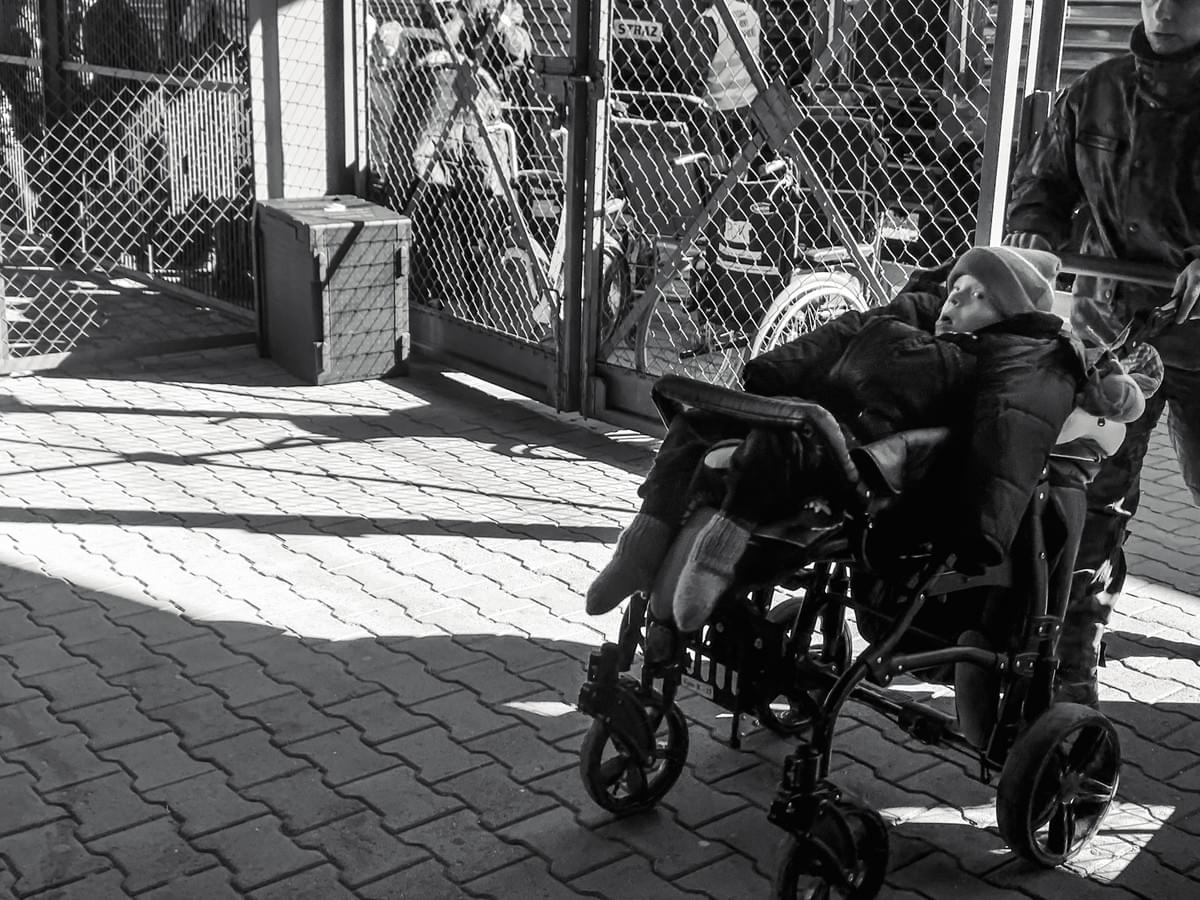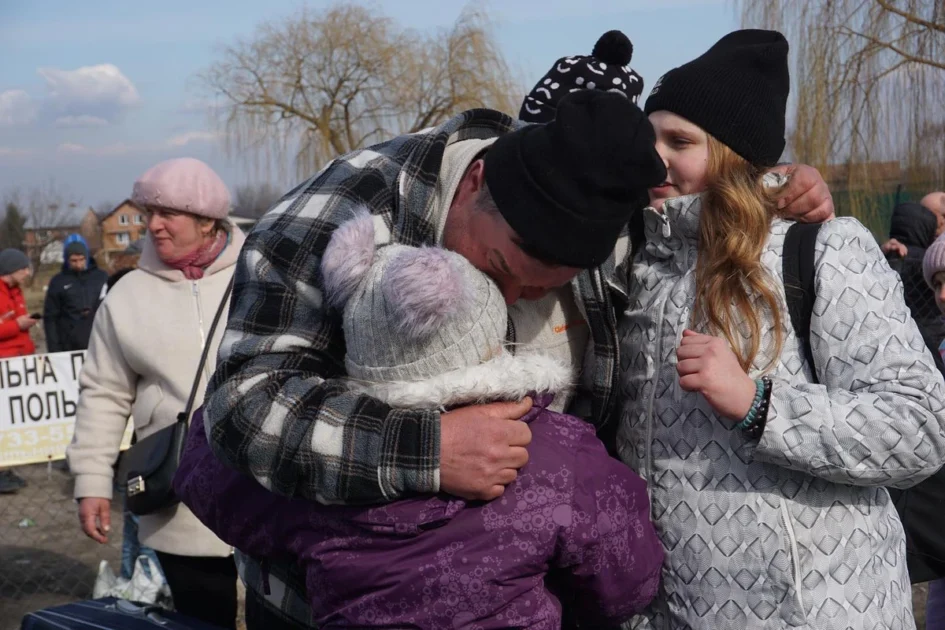By Gordon Weiss.
The train pulls into Platform 4 at Przemyśl station, track 102, the first stop after crossing the Ukrainian border. It wheezes, hissing and spitting until a last lurch into its bay forces its stop.
These trains usually carry 600 people, but trains at war are packed tight. Around 2500 people are on board, fresh from cities and villages across a Ukraine being steadily ravaged by war.

There is a long pause before people can dismount, which must seem far more attenuated for those on board. A journey between L’viv in Ukraine and Przemyśl is usually 2 hours, but this journey is more typically 5 hours long now. Why must they wait?
Ordinarily this long interlude, after weeks of waits, and pauses, wending journeys and unknown destinations, and with many more ahead, would seem a small act of unnecessary torment, the subtle petty act of universal officialdom.

But the lengthy pause is a ritual of compassion, an act of enlightened grace in the face of disfiguring terror. There is fragility aboard, and even for those exhausted by terror, who have left their husbands, fathers, and brothers inside Ukraine to fight the invasion, and who are managing their own restless children and crying infants, they understand why they must assert patience.
The platform is scattered with soldiers, civil defence personnel, customs officers, and volunteers (always volunteers; Poland has been transformed overnight into a nation of volunteers, the first line in a long fight-back against yet another precipitous Russian invasion).

The cold cuts across us, and the mid-afternoon light speckles through the cyclone-wire fencing that separates the customs area of Platform 4. Everybody is quiet, alert, and fixed on the doors that slowly begin to pop open along the length of the train. A generator hums and lined along the wall are scores of empty donated baby baskets waiting for use.

Quietly, Polish female troops, their hair tied into buns beneath their red berets, and sturdy and bearded Polish soldiers who more ordinarily would be felling trees or building dykes, or training for war, are handed small bundles, children swathed and swaddled with cloth and coat. They carry and lead their precious charges like Fabergé eggs (the irony of that Russian reference is not lost) while everybody gazes in contemplation.
These are ‘special needs’ children, forced from their homes by the hundreds, from infants to teenagers – the mentally and physically disabled swept aside by totalitarianism’s resurgent whip crack. Small faces with permanently wistful eyes look up and around at new worlds, even as they are locked into their own.

We cannot chase off this horror for now, the awful maw of an angry and mobilised Russia, but in the patience of this impatient train manifest, and with the minutes ticking past as those least capable of defending themselves are carried and helped away, a hushed sense of our own determined humanity, a bulwark that must be defended, now swells.
Wojciech Bakun, the mayor of Przemyśl, is a bulwark in spirit and in form. In three weeks, this border town of 60,000 on the edge of war-lands, has doubled in size. This giant of a man has led his people into a world newly lit by a spirit of solidarity and compassion that is reflected across Poland as people have opened their homes to whole families of ‘guests’ as the Poles persistently say.

Two million have come, and millions more are poised to come. Each day, trains leave Kraków and Warsaw, filled with Ukrainians joining family in Rome, Berlin, Sofia, or London. Some aim further – New York, Sydney, Buenos Aries – but most Ukrainians will want to remain close to home, perched at a border country which might yet itself slide into the vortex of war.

A huge supermarket at the edge of town has been turned into a gigantic community centre. Thousands are passing through – 10,000 each day – and Przemyśl’s citizens are taking care of them, with hundreds working around the clock to feed, clothe, protect, trace and systematically track the ‘guests’ as they move on to other cities around Poland and Europe, or settle in to Przemyśl because they have nowhere else to go. Hundreds of volunteers are arriving from South America, the Middle east, India, the US and Canada, and from all over Europe to back the effort.

Of course, trains have a special place in the cosmology of European warfare. At dawn today I slipped away to another town, that of Auschwitz, to make a pilgrimage 75 years in the waiting. My father never sought to visit the site of the murder of half of his family, the 58 relatives who died there. I planned it many times, but other life always took over. Even today, it would have been too easy to let it slip in the crush of work and exhaustion. But who can be exhausted now, at this moment?
Auschwitz sits in between the juncture of two rivers, and is naturally waterlogged – freezing cold in winter, and humid and insect-plagued in summer. The seven villages that existed here before the Nazis decided to situate the spoke hub of their European death machine, a series of railway track stretching across the Nazi conquered lands that could all be traced to the industrial furnaces of the Final Solution, were easy to dispose of. Most of the Jewish inhabitants were incarcerated then gassed, and their homes razed.

who happened to come from Theresienstadt in the Czech lands, I thought a skein of shimmering blonde hair
– picked out by the single sliver of light in that terrible room – very like my sisters when they were children.
Their extinction set the pace for what followed, like our tour guide listing a blizzard of statistics and cruelties that are simply numbing, even for one who knows so much about Hitlerianism, and who has thought all his life about the human propensity for unhinged butchery past the first bayonet thrust. No amount of glasses, shoes, gold fillings, or mounds of hair sheared from baby girls can explain, or lead to comprehension.
This town, synonymous with the deepest chapter of human barbarity, is just a town after all. And as I said to Wojciech Bakun, the mayor of Przemyśl, it might have been Auschwitz that wore the badge of great good in the face of such wickedness, just as Przemyśl might have chosen to turn their guests away, had the mayor been a different man, and the people easily misled.
But Auschwitz has a particular place in human history, and in the disfigurement of Europe and its Enlightenment (and supposedly human) values, one that might soon be replaced by the nuclear annihilation of a town or city in Ukraine as Russian forces are stymied.

Everything is “temporary” in life, and human affairs, and yet people know that this might last for years. We think temporary because we want it to pass, to return to the normal we knew. But we have passed through the Looking Glass, and we can never go back. Indeed, we are just at the beginning of a new beginning.
The millions of Russians who do not want this war, and those who undoubtedly do, can never go back. Their children will never claim the mantle of innocence that is their right, and their grandchildren will struggle to live down the awful legacy this conflict has provided them with.
Europe’s “problem child,” as the American writer Dorothy Thompson said of Hitler’s Germany, is now Russia (yet Putin is certainly no Hitler, for all his malignance). We must wait for the blood to spill, for her war to wane, until she can return to the fold of our shared humanity. But for now, the pathogen of war has been unleashed, and nothing can be predicted.
Feature Image: A father says goodbye to his children before returning to Ukraine, Polish/Ukrainian border. Photo: Magdalena Mistygacz.
Gordon Weiss is the author of that superb book The Cage: The Fight for Sri Lanka and the Last Days of the Tamil Tigers, a seminal text without which future discussion of the conflict will always be incomplete.
He spent two decades working for the United Nations, focused on multi-faceted peacekeeping, political, and humanitarian crises, often in isolated conditions in Africa, India, former Soviet Central Asia, the Western Balkans, the Caribbean, the Caucasus, South-East Asia, and the Middle East.
Of his personal life he writes: “I’m a father to two girls, and the son of an immigrant who became an early female judge in Australia, and a Czech refugee whose 57-member family was killed during the Holocaust. I currently live between Prague, Nairobi, and Sydney, to which the highland Scots part of my family immigrated in the 1820s.”
You can keep up to date with Gordon on his site here.
RECOMMENDED BOOKS



